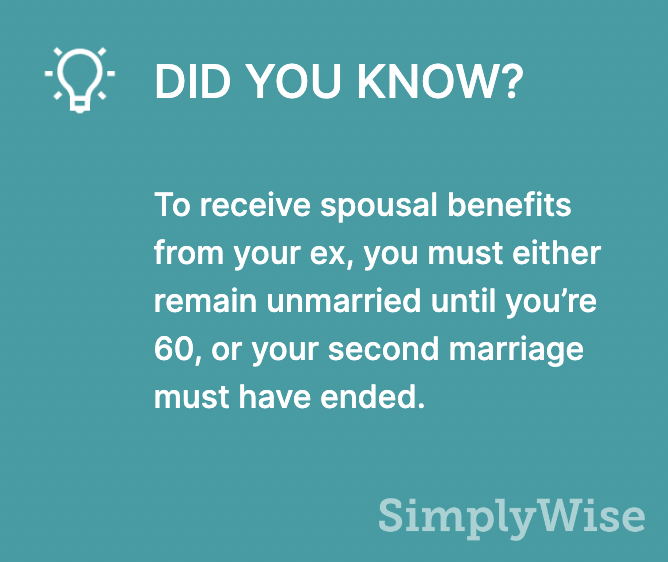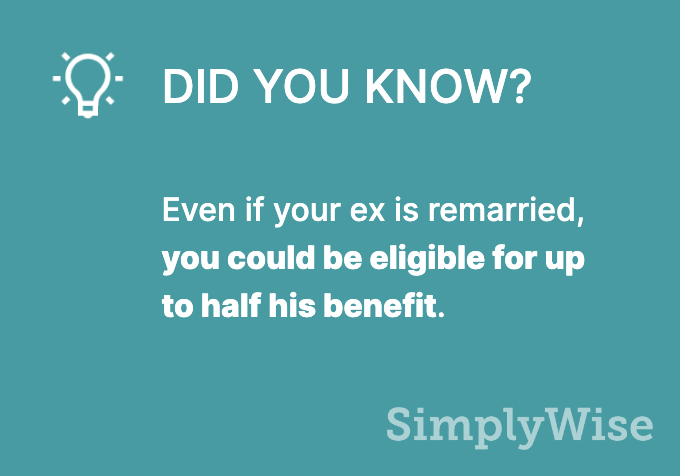
Former wives (and all spouses, for that matter) of a worker who dies can receive Social Security divorced spouse benefits, as either spousal or survivor benefits. Moreover, they can receive benefits at the same percentages as widows and widowers), as long as the marriage lasted at least 10 years. That changes if the surviving spouse remarries before age 60, but remarrying after age 60 won’t affect eligibility.
Let’s take a look at how it works:
Eligibility for divorced spousal benefits
In order to receive benefits, an ex-spouse must either remain unmarried until age 60, or the second marriage must have ended by death, divorce, or annulment. The rules for claiming benefits as an ex-spouse are slightly different than claiming benefits as a person reaching retirement age versus as a survivor whose former spouse has died.
The rules also are different for those born before Jan. 2, 1954. Ex-spouses born before this date may be able to receive divorced spousal benefits at full retirement age and delay their own retirement benefit until later. That option is not available for people filing for spousal benefits who were born after this date. Those individuals are automatically considered to have filed for all retirement benefits.
The amount an ex-spouse receives depends on many factors including:

- Whether they’re filing for spousal or survivor benefits
- Their age when they file
- The benefit due the ex-spouse as an individual worker, separate from marriage-related benefits
- How much the former spouse earned
If one or more ex-spouses receive a benefit, that does not in any way reduce the amount that the worker or their current spouse or other dependents are eligible to receive.
What about getting remarried?
Divorced spouses may be eligible for survivor benefits at any age if a child of the deceased worker lives with them and is under age 16 or is disabled. Otherwise, the spouse may become eligible for survivor benefits at age 60, or age 50 if they are disabled. In all cases, ex-spouses will only be eligible if they are not married—or if their subsequent marriage ended in death, divorce, or annulment.
Ex-spouses who can claim survivor benefits at full retirement age or older will generally get 100 percent of the worker’s basic benefit amount. After age 60, they will receive between 71 percent and 99 percent of the worker’s basic benefit amount. Marrying after age 60 will not impact an ex-spouse’s benefit.
Unlike with the spousal benefit, ex-spouses may apply for survivor benefits at age 60 or later and wait to apply for their own benefit until later—up to age 70. Doing so can earn delayed retirement credits on their own record. Working while receiving benefits may impact the benefit amount, however.
What are the divorced spouse benefit amounts
Ex-spouses entitled to benefits on their own record will receive those benefits first. If their own benefit is larger than the benefit they would receive as an ex-spouse, they will receive no spousal benefit.

However, if the benefit as an ex-spouse is larger, Social Security will increase that benefit to the larger amount. So, if an ex-spouse’s benefit would be $2,000 a month, they would be entitled to $1,000 a month as an ex-spouse. If their benefit as a worker is only $700 a month, Social Security will increase their benefit to $1,000 a month.
The maximum spousal benefit—for spouses or ex-spouses—is 50 percent of the worker’s benefit at full retirement. If an ex-spouse does not claim benefits until after full retirement—say age 70—they will receive delayed retirement credits, but their benefit will not increase.
If an ex-spouse claims benefits earlier than full retirement, the amount they receive will be permanently reduced. If they claim a benefit at age 62, instead of receiving 50 percent of their former spouse’s benefit, they will receive only about 35 percent of their benefit.
How to apply for Social Security divorced spouse benefits
If you’re not already receiving benefits, we recommend using a Social Security divorced spousal benefits checklist and going step by step, but below is a summary.
You can file for divorced spousal benefits online; by calling 1-800-772-1213 (TTY 1-800-325-0778); or by visiting a Social Security Administration office.
Here are the documents you will likely need either in original form or a certified copy:
- Your divorce decree
- Your marriage certificate
- Birth certificate or other proof of birth – the original copy
- Proof of U.S. citizenship or lawful alien status
- U.S. military discharge paper(s) if you had military service before 1968;
- W-2 forms(s) and/or self-employment tax returns for last year.
- Your Social Security number and your ex’s Social Security number and date of birth. If you don’t have this info, don’t worry: you can instead provide your ex’s name, date, place of birth, and parents’ names.
How to apply for Social Security divorced survivors benefits
If you’re not already receiving Social Security, we recommend using a widows benefits checklist and going step by step, but below is a summary.
You can file for survivors benefits by calling 1-800-772-1213 (TTY 1-800-325-0778) or visiting a Social Security Administration office.
Here are the documents you will likely need either in original form or a certified copy:
- Proof of death, either from a funeral home or the death certificate
- Your Social Security number and the deceased worker’s Social Security number
- Your birth certificate
- Your marriage certificate or divorce decree, if the deceased worker was your spouse
- The Social Security numbers and birth certificates of any dependent children
- The deceased worker’s most recent W-2
- Your bank account number so your benefits can be deposited into your account
If you are already receiving Social Security, report the death of your spouse or family member to the Social Security Administration. If you were receiving benefits based on your spouse’s work, those benefits will be switched to survivors benefits rather than spousal. If you’re receiving benefits based on your own work record, contact the Social Security Administration to see if you’re eligible for higher benefits as a widow or widower.
Just as Social Security retirement benefits aim to ensure workers can live a dignified life after they stop working, survivors benefits can provide stability and support to the family of a worker after he or she dies. The benefit can help give workers and their families a little bit of peace of mind both before and after a loss.